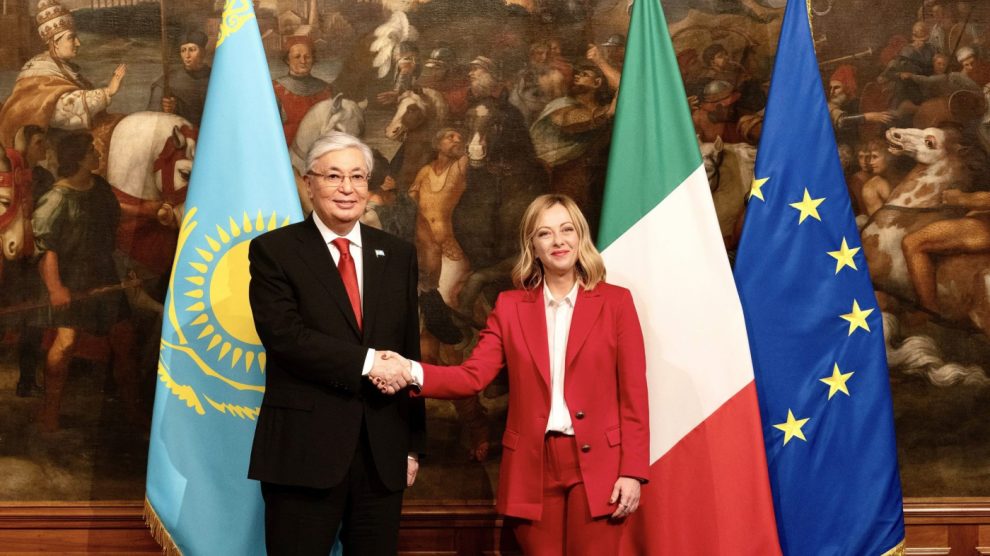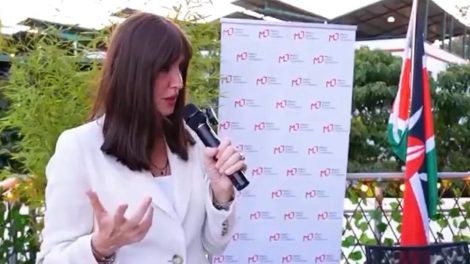Rome and Astana grow closer. On Thursday, Italian President Sergio Mattarella and Prime Minister Giorgia Meloni welcomed Kazakh President Kassym-Jomart Tokayev in the Eternal City. It was his first official visit to Italy, “a sign of the great cooperation that exists and that we wish to intensify,” as President Mattarella noted: “We are on the same wavelength in terms of international relations. Italy and Kazakhstan are bound by the principle of multilateralism. Our economic relationship is intense.”
- The visit “confirms the strategic value of the partnership and the excellent level of relations,” reads an official note from the PM’s office. She and President Tokayev signed a joint declaration and a number of memoranda of understanding, signalling a shared “desire to diversify and deepen ties in all areas of common interest.”
A growing entente. When he travelled to Astana in September, Antonio Tajani broke a 27-year-long spell by becoming the first Italian foreign minister to visit the country since 1997. Kazakhstan’s reform drive played no small part in this: as the local Italian Ambassador, Marco Alberti, told our sister website, Rome intends to take advantage of the ongoing “process of political-institutional and economic reform” that’s “destined to generate new opportunities.”
Think energy, raw materials… While in the Kazakh capital, FM Tajani had met with his counterpart Murat Nurtleu and signed a MoU (the first of its kind between Rome and Astana) centred on critical raw materials and renewables. This signalled the political will to elevate relations beyond fossil fuels. Italy remains the leading buyer of Kazakh crude oil, attracting almost 28% of its exports.
- Italian energy major Eni, a longtime oil & gas partner to Kazakhstan, has also been expanding the country’s renewable power capacity. Its subsidiary recently brought online a 50 Mw solar plant, complementing two wind farms that have been in operation since 2020 and 2022, respectively.
- The MoU focused on critical materials, rare earths and green hydrogen. The formers are essential to Italy’s and Europe’s strategic diversification efforts, and Kazakhstan, the top producer of some of the most crucial products in the field, also has a MoU with the EU – which Italy’s own latches onto.
… and beyond. Numbers indicate that wider economic relations have the potential to expand: in 2022, there was a record interchange of €4.5 billion, and Italian exports jumped 66%. Italy is also the first European buyer of Kazakh goods, and second globally, always among the top foreign investors, and Italian companies are looking with interest at Kazakhstan’s improving investment conditions.
- Italian fashion brands, aided by ICE (the State’s office for foreign promotion and internationalisation of Italian produce), have been a key driver of exchange, increasing their exports by nearly 90% year-on-year and expanding their marketing initiatives in the country.
- SIMEST, CDP’s foreign growth company, is also consolidating the commercial channel: on Wednesday, its chair Pasquale Salzano signed an agreement to encourage mutual investments with Zhandos Temirgali, Acting Chairman of the Management Board of Kazakh Invest.
- This happened during a business roundtable at the Italian Ministry of Foreign Affairs opened by President Tokayev and FM Tajani.
- Rome has also set up an Italian Institute of Culture in Astana, the first in the Asian macro-area, looking to leverage cultural exchanges (via 97 inter-university cooperation agreements in place and political-institutional dialogue on major multilateral issues) to build a more far-reaching strategic partnership.
Look to Russia. Or rather, don’t. Astana’s reform drive is happening against a backdrop of shifting equilibriums and alliances. The region’s historic interlocutor, Moscow, has been significantly weakened by its war efforts and has been losing political capital, as demonstrated by its hands-off approach to last year’s conflict in the Nagorno-Karabakh region. Rome, which is expanding its presence in the wider Asian and Indo-Pacific region, intends to leverage the conditions to build stronger ties and consolidate the country’s connection with the Western sphere.





